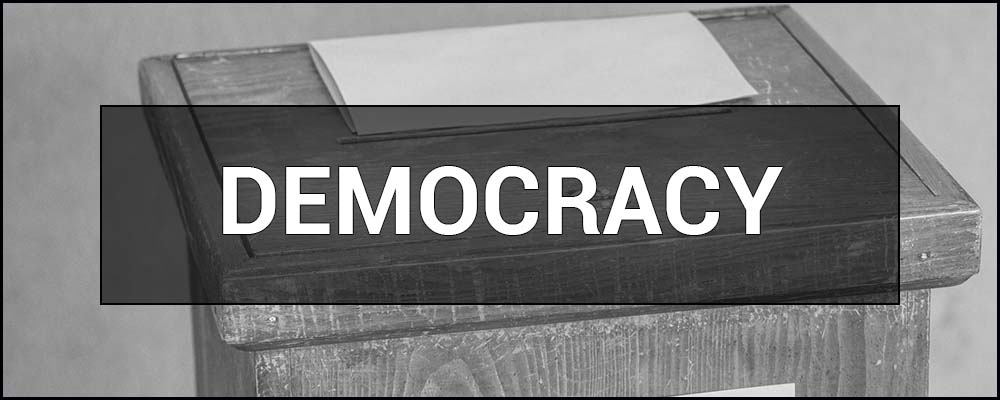Democracy is a term used to describe a political system of government, an idea, and a concept based on the principles of people’s power. Literally, the word “democracy” means “power of the people” and has Ancient Greek origin, because it was there that the basic ideas of the democratic concept of governance were formed and implemented.
What is DEMOCRACY — definition and meaning in simple words.
In simple terms, democracy is a system of government in which the source of power is the people themselves. It is the people who decide what laws and regulations are necessary for the harmonious existence and development of the state. Thus, each person in a democratic society receives a certain set of freedoms and obligations formed with the interests of the entire community in mind. Based on the above, it can be concluded that democracy is an opportunity for every person to freely participate in the direct management of their state, society and personal destiny.
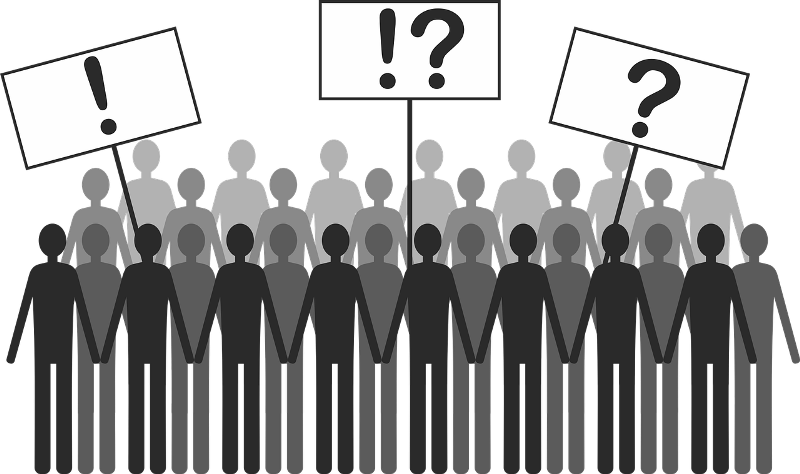
Forms of democracy.
Having learned the definition of the term “democracy,” questions naturally arise such as: “How exactly does the people govern the state?” and “What are the forms and methods of democratic governance?” At the moment, there are two main concepts of the exercise of people’s power in a democratic society. These are:
- Direct democracy
- Representative democracy
What is Direct Democracy?
Direct democracy is a system in which all decisions are made directly by the people themselves through their direct expression of will. This procedure is made possible by holding various referendums and polls. For example, it may look like this: In the state “N”, it is necessary to pass a law banning the consumption of alcoholic beverages at a certain time. To do this, a referendum is held where residents vote “For” or “Against” this law. The decision on whether the law will be adopted or not is based on how the majority of citizens voted.
It is worth noting that, given the development of modern technologies, such referendums can be held quite quickly and efficiently. The fact is that almost all citizens have modern gadgets (smartphones) that can be used to vote. But, most likely, states will not use direct democracy, at least not in full. This is because direct democracy has a number of problems, which we will discuss below.
Problems of direct democracy.
The main problems of direct democracy include such an aspect as the number of people. The fact is that the principle of permanent direct popular governance is possible only in relatively small social groups, where constant discussions and compromises are possible. Otherwise, decisions will always be made to suit the mood of the majority, without taking into account the opinion of the minority. It follows that decisions can be made based on the sympathies of the majority, rather than on the logical and reasonable opinions of the minority. This is the main problem. The fact is that not all citizens are, so to speak, politically and economically literate. Accordingly, in most cases, the decisions made by them (the majority) will be wrong in advance. To put it in very simple terms, it would be wrong to entrust the management of important political and economic affairs to people who do not understand them.
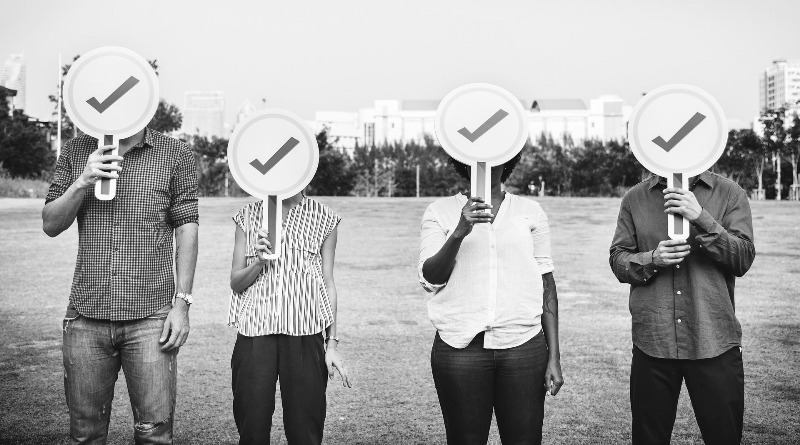
What is representative democracy?
Representative democracy is the most common type of government in which people delegate some of their powers to elected officials. In simple terms, representative democracy is when people choose their government through popular elections, and then the elected government is responsible for governing the country. People, in turn, reserve the right to control the government using various levers of influence: impeachment, resignation of the government (official), revolution, lustration, referendum, etc.
At this stage of human society’s development, representative democracy proves to be the most effective way of governance, but it is not without its drawbacks. The main problems of this form include: bureaucracy, populism, corruption, usurpation of power and other unpleasant moments. It is to prevent such problems that society must always be active and constantly keep the authorities under control.

The essence and principles of democracy. Conditions and signs of democracy.
Moving on to this relatively large section, it is first of all worth listing the main points or the so-called “pillars” on which the whole concept of democracy is based.
The main pillars on which democracy is based:
- Sovereignty of the people;
- The government is formed with the consent of the people;
- The principle of majority rule;
- Minority rights are respected;
- Fundamental human rights and freedoms are guaranteed;
- Free and fair elections;
- Equality before the law;
- Respect for legal procedures;
- Constitutional limitations on government (power);
- Social, economic and political pluralism;
- Values of tolerance, pragmatism, cooperation, and compromise.
Thus, having familiarized ourselves with the basis, we can move on to analyze the concept in more detail.
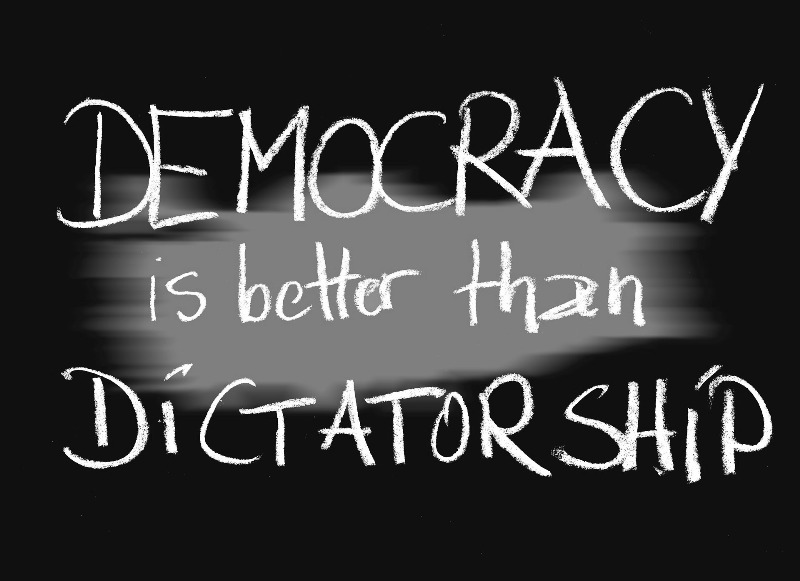
What does democracy consist of?
For a better understanding of all the key points of democracy, it is necessary to break down the concept into its main key elements. There are four of them in total, these are:
- The political system and the electoral system;
- Citizen participation in the political and social life of the state;
- Protection of citizens’ rights;
- The rule of law (equality before the law).
Figuratively speaking, we will now analyze the above points in detail and find out what the conditions for democracy to flourish should be.
Political system and election system.
- The ability to choose your leaders and hold them accountable for their actions while in office.
- People decide who will represent them in parliament and who will lead the government at the national and local levels. They do so by choosing between competing parties in regular, free and fair elections.
- In a democracy, the people are the ultimate form of political power.
- Power is transferred from the people to the government only for a certain period of time.
- Laws and policies require the support of a majority in parliament, but minority rights are protected in a variety of ways.
- People can criticize their elected leaders and representatives. They can observe how they work.
- Elected representatives at the national and local levels should listen to people and respond to their requests and needs.
- Elections should be held at regular intervals, as provided by law. Those in power cannot extend their term in office without asking for the people’s consent in a referendum.
- For elections to be free and fair, they must be supervised by a neutral, professional body that treats all political parties and candidates equally.
- All parties and candidates should have the right to campaign freely.
- Voters should be able to vote in secret, free from intimidation and violence.
- Independent observers should be able to observe the voting and the counting of votes to ensure that the process is free from corruption, intimidation, and fraud.
- Disputes over election results are adjudicated by an impartial and independent court.
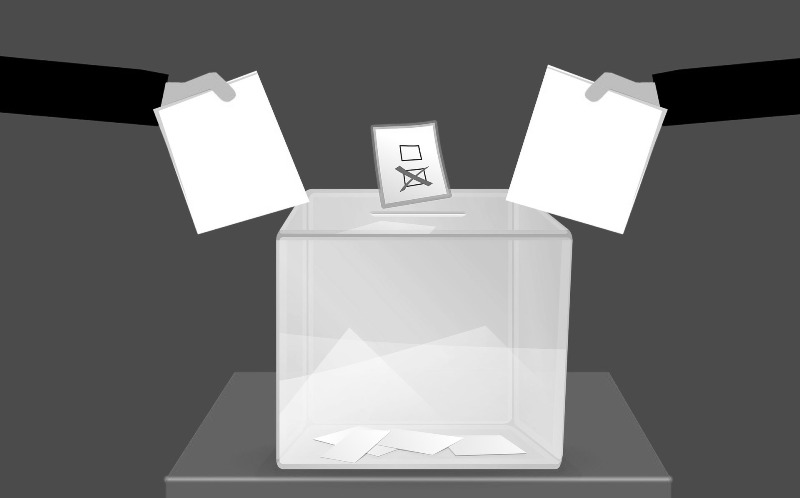
- The key role of citizens in a democracy is to participate in public life.
- Citizens are obliged to closely monitor how their political leaders and representatives use their powers, as well as to express their own opinions and wishes.
- Voting in elections is an important civic duty of all citizens.
- Citizens should make their choice after thoroughly understanding the election programs of all candidates, which ensures objectivity in decision-making.
- Citizens can actively participate in election campaigns, public discussions and protests.
- The most important form of participation is membership in independent non-governmental organizations that represent their interests. These are: farmers, workers, doctors, teachers, business owners, religious believers, students, human rights activists, and so on.
- In a democracy, participation in civil associations should be voluntary. No one should be forced to join an organization against their will.
- Political parties are incredibly important organizations in a democracy, and democracy becomes stronger when citizens become active members of political parties. However, no one should be forced to support a political party because they are under pressure. In a democracy, citizens can freely choose which party to support.
- Citizens’ activities should be peaceful. Respecting the law and tolerating the views of opponents.
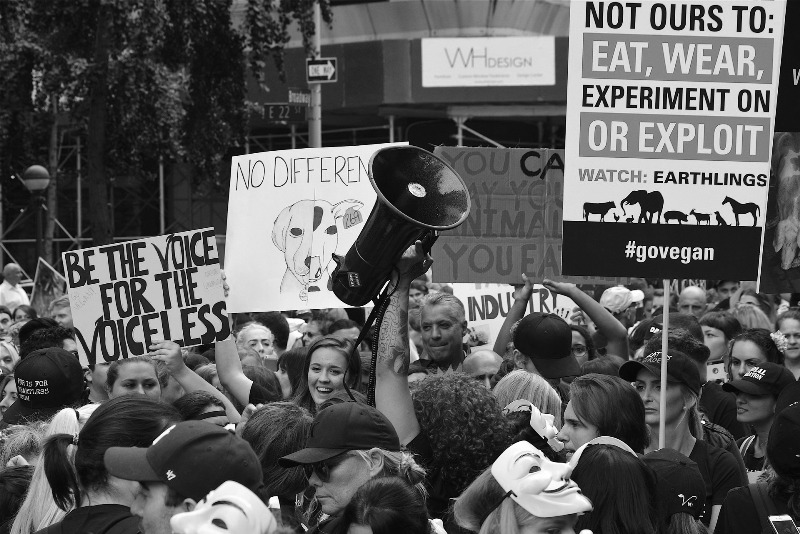
Protection of citizens’ rights.
- In a democracy, every citizen has certain fundamental rights that cannot be taken away by the state. These rights are guaranteed by international law.
- Citizens have the right to their own beliefs. They have the right to speak and write freely about what they think. No one can tell a citizen how to think, believe, speak or write.
- There is freedom of religion. Everyone is free to choose his or her religion and worship it as he or she sees fit.
- Everyone has the right to enjoy their own culture with other members of their group, even if their group is a minority.
- There is freedom and pluralism in the media. A person can choose between different sources of news and opinions.
- A person has the right to communicate with other people and to form and join organizations of his or her choice.
- A person may move freely within the country, or leave it if he or she wishes.
- A person has the right to freedom of assembly and protest against government actions. However, a citizen is obliged to carry out these actions peacefully and with respect for the law and the rights of other citizens.
The rule of law.
- In a democracy, the rule of law protects the rights of citizens, maintains order and limits the power of the government.
- All citizens are equal before the law. No one can be discriminated against on the basis of race, religion, ethnicity, or gender.
- No one may be arrested, imprisoned, or expelled arbitrarily.
- A person is presumed innocent until proven guilty according to the law. Anyone accused of committing a crime has the right to a fair and public hearing before an impartial tribunal.
- No one shall be taxed or prosecuted except in cases provided for by law.
- No one is above the law, not even the king or the elected president.
- The law shall be fairly, impartially, and consistently applied by courts independent of the other branches of government.
- Torture and cruel and inhuman treatment are absolutely prohibited.
- The rule of law limits the power of the government. No government official may violate these limits. No government official, minister or political party can tell a judge how to decide a case.
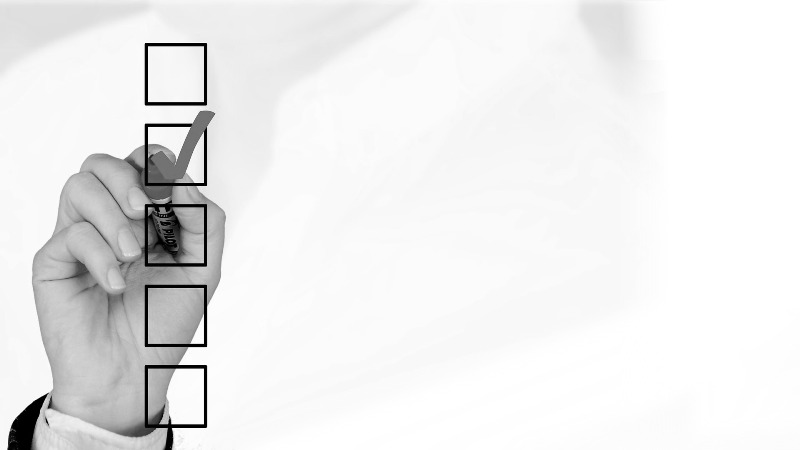
Requirements to society for the normal functioning of a democratic system.
- Citizens must not only exercise their rights, but also adhere to certain principles and rules of democratic behavior.
- People must respect the law and reject violence. Nothing justifies the use of violence against your political opponents just because you disagree with them.
- Every citizen must respect the rights of their fellow citizens and their dignity as human beings.
- No one should condemn a political opponent as pure evil simply because they have different views.
- People should question government decisions, but not reject the government’s authority.
- Every group has the right to practice its culture and have some control over its affairs. But at the same time, such a group must recognize that it is part of a democratic state.
- When a person expresses his or her opinion, he or she must also listen to the opinion of the opponent. Everyone has the right to be heard.
- When people make demands, they must understand that in a democracy, it is impossible to please everyone. Democracy requires compromise. Groups with different interests and opinions must be willing to reach an agreement. Under these conditions, one group may not always get everything it wants, but the possibility of compromise leads to the common good.
Conclusion.
In conclusion, I would like to end this article with the words of a truly great man, Winston Churchill. He once said:
Democracy is the worst form of government, except for all the others that have been tried from time to time.
And apparently, he was right.

